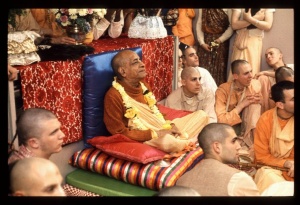CC Adi 17.155 (1975): Difference between revisions
(Vanibot #0027: CCMirror - Mirror CC's 1996 edition to form a basis for 1975) |
(Vanibot #0020: VersionCompareLinker - added a link to the Version Compare feature) |
||
| Line 2: | Line 2: | ||
<div style="float:left">'''[[Sri Caitanya-caritamrta (1975)|Śrī Caitanya-caritāmṛta (1975)]] - [[CC Adi (1975)|Ādi-līlā]] - [[CC Adi 17 (1975)|Chapter 17: The Pastimes of Lord Caitanya Mahāprabhu in His Youth]]'''</div> | <div style="float:left">'''[[Sri Caitanya-caritamrta (1975)|Śrī Caitanya-caritāmṛta (1975)]] - [[CC Adi (1975)|Ādi-līlā]] - [[CC Adi 17 (1975)|Chapter 17: The Pastimes of Lord Caitanya Mahāprabhu in His Youth]]'''</div> | ||
<div style="float:right">[[File:Go-previous.png|link=CC Adi 17.154 (1975)|Ādi-līlā 17.154]] '''[[CC Adi 17.154 (1975)|Ādi-līlā 17.154]] - [[CC Adi 17.156 (1975)|Ādi-līlā 17.156]]''' [[File:Go-next.png|link=CC Adi 17.156 (1975)|Ādi-līlā 17.156]]</div> | <div style="float:right">[[File:Go-previous.png|link=CC Adi 17.154 (1975)|Ādi-līlā 17.154]] '''[[CC Adi 17.154 (1975)|Ādi-līlā 17.154]] - [[CC Adi 17.156 (1975)|Ādi-līlā 17.156]]''' [[File:Go-next.png|link=CC Adi 17.156 (1975)|Ādi-līlā 17.156]]</div> | ||
{{CompareVersions|CC|Adi 17.155|CC 1975|CC 1996}} | |||
{{RandomImage}} | {{RandomImage}} | ||
==== TEXT 155 ==== | ==== TEXT 155 ==== | ||
<div class="verse"> | <div class="verse"> | ||
:kājī kahe, | :kājī kahe,--tomāra yaiche veda-purāṇa | ||
:taiche āmāra | :taiche āmāra śāstra--ketāva 'korāṇa' | ||
</div> | </div> | ||
| Line 25: | Line 24: | ||
<div class="translation"> | <div class="translation"> | ||
The Kazi replied, | The Kazi replied, "As You have Your scriptures called the Vedas and Purāṇas, we have our scripture, known as the holy Koran. | ||
</div> | </div> | ||
| Line 32: | Line 31: | ||
<div class="purport"> | <div class="purport"> | ||
Chand Kazi agreed to talk with Śrī Caitanya Mahāprabhu on the strength of the scriptures. According to the Vedic scripture, if one can support his position by quoting from the Vedas, his argument is perfect. Similarly, when the Muslims support their position with quotations from the Koran, their arguments are also authorized. When Lord Śrī Caitanya Mahāprabhu raised the question of the | Chand Kazi agreed to talk with Śrī Caitanya Mahāprabhu on the strength of the scriptures. According to the Vedic scripture, if one can support his position by quoting from the Vedas, his argument is perfect. Similarly, when the Muslims support their position with quotations from the Koran, their arguments are also authorized. When Lord Śrī Caitanya Mahāprabhu raised the question of the Muslims' cow-killing and bull-killing, Chand Kazi came to the standard of understanding from his scriptures. | ||
</div> | </div> | ||
Latest revision as of 16:05, 26 January 2020

A.C. Bhaktivedanta Swami Prabhupada
TEXT 155
- kājī kahe,--tomāra yaiche veda-purāṇa
- taiche āmāra śāstra--ketāva 'korāṇa'
SYNONYMS
kājī kahe—the Kazi replied; tomāra—Your; yaiche—as much as; veda-purāṇa—the Vedas and Purāṇas; taiche—similarly; āmāra—our; śāstra—scripture; ketāva—the holy book; korāṇa—the Koran.
TRANSLATION
The Kazi replied, "As You have Your scriptures called the Vedas and Purāṇas, we have our scripture, known as the holy Koran.
PURPORT
Chand Kazi agreed to talk with Śrī Caitanya Mahāprabhu on the strength of the scriptures. According to the Vedic scripture, if one can support his position by quoting from the Vedas, his argument is perfect. Similarly, when the Muslims support their position with quotations from the Koran, their arguments are also authorized. When Lord Śrī Caitanya Mahāprabhu raised the question of the Muslims' cow-killing and bull-killing, Chand Kazi came to the standard of understanding from his scriptures.